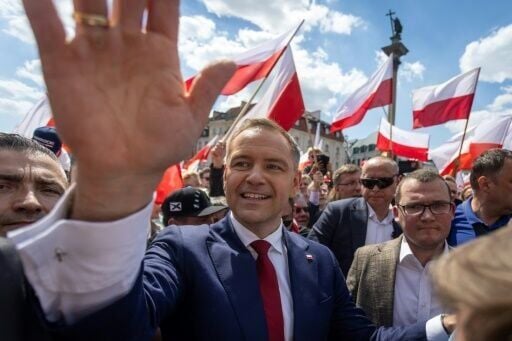Karol Nawrocki Elected as Poland’s New President in Narrow Victory
In a closely contested runoff election, Poland has elected Karol Nawrocki as its new president. The final vote count released on Monday revealed that Nawrocki, a conservative politician supported by former U.S. President Donald Trump, received 50.89% of the votes. His opponent, liberal Warsaw Mayor Rafał Trzaskowski, secured 49.11%. This election result signifies a significant political shift in Poland and reflects deeper divisions within the country, particularly along NATO’s eastern flank and within the European Union.
The Election Results and Implications
The presidential runoff was a culmination of an intense electoral process that began with the initial round of voting two weeks ago. The divided results highlighted not only the split in Polish society but also underlined the varying political ideologies that have become prominent in contemporary Europe. Nawrocki’s win comes as he prepares to take over the presidency from Andrzej Duda, his conservative predecessor, whose term is set to conclude on August 6.
Trzaskowski, acknowledging the narrow defeat, extended his congratulations to Nawrocki and expressed his gratitude to supporters for their efforts during the campaign. His concession indicates a likely acceptance of the electoral outcome, paving the way for a transition of power.
Support from Key Figures
The election saw significant involvement from international figures, notably U.S. Department of Homeland Security Secretary Kristi Noem, who publicly backed Nawrocki at the Conservative Political Action Conference held in Warsaw. During her speech, she criticized what she described as “weak” European leaders and advocated for maintaining Poland’s stringent border policies.
The relationship between Nawrocki and Donald Trump further solidified through their interactions during Nawrocki’s campaign, culminating in a White House visit earlier in May. Trump’s endorsement is believed to have bolstered Nawrocki’s campaign, aligning Polish politics more closely with the U.S. administration’s conservative values.
International Reactions and Future Prospects
Ukrainian President Volodymyr Zelenskyy was quick to congratulate Nawrocki following his victory. Zelenskyy emphasized Poland’s pivotal role in ensuring regional and European security, highlighting the importance of cooperation between the two nations amidst ongoing geopolitical tensions.
With around 10,000 U.S. troops stationed in Poland, Secretary Noem suggested that Nawrocki’s leadership would likely enhance military collaboration, further solidifying the strategic partnership between the United States and Poland. Nawrocki has previously echoed Trump’s strong stance on supporting Ukraine while also voicing criticism towards Zelenskyy, illustrating a complex dynamic in Polish-Ukrainian relations. Moreover, Nawrocki’s commitment to prioritizing Polish citizens for social services signifies his domestic focus, which may have implications for Poland’s engagement with Ukraine.
Regional Political Alignments
International reactions did not stop at Ukraine. Hungarian Prime Minister Viktor Orbán, a significant figure in European conservative politics and a political ally of Nawrocki, lauded his “fantastic victory.” The endorsement from Orbán reflects a broader alignment among national conservative leaders in Europe.
Ursula von der Leyen, President of the European Commission, also offered congratulations to Nawrocki. Her remarks underscored the importance of continued collaboration between the EU and Poland, despite the challenges that may arise from differing political ideologies and national policies.
The Return of the Law and Justice Party
Nawrocki’s election marks a significant comeback for the Law and Justice Party (PiS), which previously held power from 2015 to 2023 before being ousted by a centrist coalition led by Prime Minister Donald Tusk. This political shift could impact Tusk’s administration, especially given Duda’s prior veto power, which posed obstacles to Tusk’s pro-European Union initiatives.
As Nawrocki takes office, the implications of his presidency could reverberate throughout Polish politics and its relationships within the EU. His administration’s stance towards EU policies, NATO commitments, and relations with neighboring countries will likely shape Poland’s political landscape in the years to come.
Conclusion
Karol Nawrocki’s narrow victory in the presidential runoff election is a pivotal moment for Poland. As a conservative figure backed by influential leaders such as Donald Trump, his presidency is expected to navigate the complexities of both domestic priorities and international relations. With Nawrocki at the helm, Poland stands poised to reaffirm its national interests while simultaneously grappling with its role within the European Union and its interactions with key global partners. The coming months will reveal how Nawrocki’s administration will approach these challenges and opportunities in a rapidly changing geopolitical environment.
The Associated Press contributed to this report.
